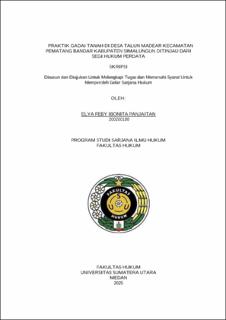| dc.description.abstract | The practice of land pawning in Talun Madear Village, Pematang Bandar Subdistrict, Simalungun Regency, is still predominantly carried out orally without written agreements, despite being regulated under the Indonesian Civil Code (KUHPerdata) and Government Regulation in Lieu of Law (Perpu) No. 56 of 1960. This situation raises legal issues, particularly regarding legal certainty and protection for the parties involved in such transactions. This study aims to examine the practice of land pawning in the village from the perspective of Indonesian positive civil law, to identify the challenges faced in its implementation, and to explore efforts that can be taken to address these challenges.
This research is a normative legal study with a descriptive-analytical nature, using statutory and conceptual approaches. The data consist of primary and secondary sources, collected through library research and supported by field interviews. Data collection tools include document studies and interview guidelines, analyzed qualitatively with deductive reasoning.
The findings reveal that land pawning practices in Talun Madear Village have not fully reflected the principles of legality and legal protection. Substantive legal obstacles include noncompliance with Article 1320 of the KUHPerdata concerning the validity requirements of agreements, and the community's lack of awareness regarding the maximum pawn period of seven years as stipulated in Article 7 of Perpu No. 56 of 1960. Structural legal challenges stem from the limited active role of village authorities in recording and supervising land pawning transactions. Culturally, the community still strongly adheres to oral traditions, resulting in low legal awareness and reluctance to adopt written legal procedures. Consequently, this gives rise to problems such as difficulties in reclaiming pawned land, disputes among families, and the absence of legal proof in formal dispute resolution. To overcome these issues, concrete steps are needed, including enhanced legal education, drafting of written pawn agreements involving village officials, simplification of administrative procedures, and strengthening the role of village-based mediation for non-litigation dispute resolution. In doing so, the practice of land pawning in Talun Madear Village can be brought more in line with the principles of justice, legal certainty, and legal protection as upheld in the Indonesian civil law system | en_US |


